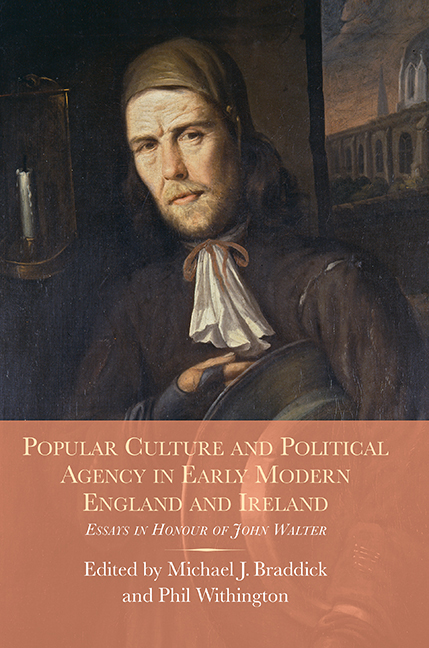 Popular Culture and Political Agency in Early Modern England and Ireland
Popular Culture and Political Agency in Early Modern England and Ireland Published online by Cambridge University Press: 09 May 2017
This chapter examines the rhetoric of corruption. It argues that the language of corruption in early modern England was religiously inflected; that anti-popery provided an important idiom for the articulation of ideas about corruption; and that this process was political, excluding some from exercising power as well as providing a powerful weapon against enemies, thereby providing a means of delegitimising their authority or reputation. Corruption and anti-corruption thus had agency, though the latter was something of a double-edged sword: attacks on corruption could provide powerful legitimation for those who made them, especially when wielded against office holders, but allegations of anti-corruption could also be dangerous when deployed back on those making them. Anti-corruption was thus, like the anti-popery it often incorporated, an enabling and powerful language that had political motivations and consequences. ‘Corruption’ was not a consensual and static category, but rather a contested and fluid one which easily became part of struggles between Catholics and Protestants and also between individuals or partisans contending for power. Corruption was thus one of the many early modern keywords available to both high and low as a means to blacken, castigate, condemn and delegitimise. The chapter therefore builds on John Walter's insights about legitimation and delegitimation strategies, and about the important role of religion in these. The first section examines anti-popery as a discourse that united many of the different ways of thinking about corruption that prevailed in the sixteenth and seventeenth centuries. The second half explores how this discourse was used in practice, underlining not only the power that anti-corruption had to bring down opponents, but also the risks in using the rhetoric of corruption because it was a weapon that was very difficult to control and monopolise.
These themes have a broader significance in relation to recent social science research into the role of religion in shaping perceptions of corruption. Building on Weber's classic thesis about a link between Protestantism and capitalism, such work has explored a possible link between religion and corruption in the modern world. At least six studies have found a correlation between Protestantism and low levels of corruption, and between Catholicism and high levels of it. Robert Putnam has suggested that the Catholic Church had an adverse effect on trust, because vertical bonds of clerical authority undermined horizontal bonds of fellowship.
To save this book to your Kindle, first ensure [email protected] is added to your Approved Personal Document E-mail List under your Personal Document Settings on the Manage Your Content and Devices page of your Amazon account. Then enter the ‘name’ part of your Kindle email address below. Find out more about saving to your Kindle.
Note you can select to save to either the @free.kindle.com or @kindle.com variations. ‘@free.kindle.com’ emails are free but can only be saved to your device when it is connected to wi-fi. ‘@kindle.com’ emails can be delivered even when you are not connected to wi-fi, but note that service fees apply.
Find out more about the Kindle Personal Document Service.
To save content items to your account, please confirm that you agree to abide by our usage policies. If this is the first time you use this feature, you will be asked to authorise Cambridge Core to connect with your account. Find out more about saving content to Dropbox.
To save content items to your account, please confirm that you agree to abide by our usage policies. If this is the first time you use this feature, you will be asked to authorise Cambridge Core to connect with your account. Find out more about saving content to Google Drive.